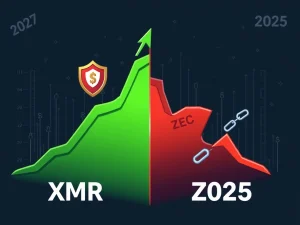Shocking Revelation: US TikTok Influencer Jailed for Orchestrating $17M North Korean Cyber Scheme

In an era where digital influence often translates to economic power, a recent federal sentencing has sent a chilling message about the darker side of online operations. The case of Christina Marie Chapman, a U.S. TikTok influencer, serves as a stark reminder that the digital realm is not immune to grave national security threats. This unfolding story reveals how a seemingly legitimate tech recruitment expert became a central figure in a sophisticated North Korean cyber scheme, siphoning millions of dollars from U.S. companies and funneling it directly to Pyongyang. For anyone interested in the intersection of cyber security, international relations, and illicit finance, this case highlights critical vulnerabilities and the evolving landscape of global cyber threats.
Unmasking the Audacious North Korean Cyber Scheme
The details of the operation orchestrated by Christina Marie Chapman paint a troubling picture of how state-sponsored actors exploit modern vulnerabilities. From 2020 to 2024, Chapman, a TikTok influencer who cultivated an image as a tech recruitment specialist, facilitated a scheme that allowed North Korean operatives to secure remote employment at over 300 U.S. and two international companies. This wasn’t just about jobs; it was a strategic infiltration that generated an astonishing $17 million in illicit revenue for the North Korean regime.
The modus operandi was deceptively simple yet highly effective:
- Identity Theft: Chapman and her associates leveraged stolen U.S. identities to create fake profiles for the North Korean workers.
- Remote Hiring Exploitation: They capitalized on the surge in remote work opportunities, where face-to-face verification is often bypassed.
- Infiltration: These operatives, many based in China or near the China–North Korea border, gained access to sensitive corporate systems, including those of Fortune 500 firms and a major television network.
- Financial Laundering: Funds obtained through these fraudulent jobs were laundered through U.S. banks, with falsified reports submitted to the IRS and Social Security Administration.
The scale of this operation underscores the adaptability of state actors in leveraging digital platforms for economic espionage and sanctions evasion.
From TikTok Fame to Federal Prison: The TikTok Influencer’s Double Life
Christina Marie Chapman, 50, presented herself as a legitimate tech recruiter, building an online persona that attracted clients. However, behind this facade, she was actively managing a network designed to place North Korean IT workers into unsuspecting U.S. businesses. The Department of Justice (DOJ) uncovered that Chapman forged 68 stolen identities to deceive 309 U.S. businesses and two international companies. This deep level of deception allowed North Korean operatives to remain undetected, with many firms completely unaware of their true affiliations.
A search of Chapman’s Arizona home in 2023 revealed over 90 laptops, all linked to fraudulent identities. These devices were central to facilitating payroll checks and laundering the illicit funds. Her sentencing to 102 months in federal prison, along with three years of supervised release, forfeiture of $284,000, and restitution of $176,850, sends a clear message: individuals who enable foreign adversaries to exploit domestic economic systems will face severe legal consequences, regardless of their public persona or platform.
Strengthening Remote Work Security: Lessons from a Major Breach
The Chapman case highlights critical vulnerabilities in remote hiring practices and the urgent need for enhanced remote work security. As remote work becomes a permanent fixture for many companies, the traditional due diligence processes often fall short when dealing with sophisticated identity theft and foreign state actors. The scheme circumvented corporate safeguards by:
- Leveraging Remote Work Arrangements: The lack of physical presence made it easier for operatives to hide their true identities and locations.
- Exploiting Third-Party Recruiters: The reliance on external recruiters like Chapman, who may not have robust verification protocols, created a weak link.
- Identity Verification Gaps: Current identity verification methods proved insufficient against forged documents and stolen identities.
This incident prompts a crucial re-evaluation of how companies vet remote employees, particularly those hired through third-party agencies. Stricter verification protocols, including biometric checks, enhanced background investigations, and continuous monitoring, are becoming imperative to protect sensitive corporate infrastructure from foreign exploitation.
The High Stakes of Sanctions Evasion: North Korea’s Digital War Chest
This case is not an isolated incident but rather a piece of a larger puzzle involving North Korea’s relentless pursuit of funds to finance its illicit nuclear and ballistic missile programs. North Korea has increasingly relied on cyber-enabled tactics, including massive cryptocurrency theft, as a primary source of revenue, especially in the face of international sanctions. The DOJ emphasized that the $17 million generated by Chapman’s operation underscores the significant financial dimensions of such schemes, which often bypass traditional smuggling or hacking methods.
For instance, a 2024 Chainalysis report estimated that North Korea-linked hackers stole an astounding $1.34 billion in crypto that year alone, exploiting the sector’s decentralized nature and, in some cases, lax security or hiring protocols within crypto companies. This reliance on digital assets for sanctions evasion demonstrates the regime’s adaptability and determination. The Chapman case exemplifies how state actors co-opt individuals in the digital space to infiltrate Western economies, highlighting a growing threat to global financial stability and national security.
A United Front Against Cybercrime: Protecting Our Digital Borders
The Chapman sentencing reflects a broader shift in U.S. enforcement priorities toward targeting intermediaries in transnational schemes. While North Korea’s cyber activities are well-documented, this case brings to light the innovative ways state-backed actors leverage digital platforms for recruitment and infiltration. The incident also raises critical questions for social media platforms like TikTok, which has faced scrutiny for its content moderation policies. While TikTok has not directly commented on Chapman’s case, the incident adds pressure on platforms to:
- Monitor Recruitment Content: Implement more rigorous monitoring of recruitment-related content, especially from users with ties to sanctioned countries.
- Verify User Legitimacy: Enhance mechanisms for verifying the legitimacy of users, particularly those offering recruitment services.
- Flag High-Risk Activity: Develop systems to flag or disclose high-risk recruitment activity to prevent similar schemes.
Combating cybercrime requires a multi-faceted approach involving law enforcement, corporations, and technology platforms. The DOJ’s clear message is that enabling foreign adversaries to exploit domestic economic systems will result in severe legal consequences, even when operating under the guise of social media influence.
Conclusion: Vigilance in a Connected World
The sentencing of Christina Marie Chapman serves as a powerful cautionary tale in our increasingly interconnected world. It underscores the sophisticated and evolving nature of cyber threats, particularly those originating from state-sponsored actors like North Korea. The case highlights how seemingly legitimate online activities can mask illicit operations designed to undermine national security and exploit economic systems. For businesses, the emphasis on robust remote work security and stringent identity verification is paramount. For individuals, it’s a reminder of the need for vigilance against deceptive online schemes. As digital platforms continue to shape our lives, the collective responsibility to identify, report, and combat these insidious threats becomes ever more critical to safeguarding our digital borders and financial integrity.
Frequently Asked Questions (FAQs)
Q1: What was the core of the North Korean cyber scheme orchestrated by Christina Marie Chapman?
A1: The scheme involved Christina Marie Chapman, a U.S. TikTok influencer, using stolen U.S. identities to help North Korean operatives secure remote jobs at over 300 U.S. and international companies. This allowed the operatives to access corporate systems and funnel approximately $17 million in illicit revenue to the North Korean regime.
Q2: How did the TikTok influencer facilitate this scheme?
A2: Christina Marie Chapman, presenting herself as a tech recruitment expert, managed a network that connected North Korean workers (often operating from China) to U.S. corporate systems. She forged 68 stolen identities and facilitated payroll checks and money laundering through U.S. banks, falsifying reports to government agencies.
Q3: What are the implications of this case for remote work security?
A3: The case highlights significant vulnerabilities in remote hiring practices. It underscores the need for stricter verification protocols for remote employees, especially those hired through third-party recruiters, to prevent identity theft and the infiltration of corporate systems by malicious actors or state-sponsored operatives.
Q4: How does this scheme relate to North Korea’s broader cyber activities and sanctions evasion?
A4: This operation is part of North Korea’s broader strategy of using cyber-enabled tactics, including extensive cryptocurrency theft, to generate funds and circumvent international sanctions. The $17 million secured through this scheme contributed directly to funding Pyongyang’s illicit nuclear and ballistic missile programs, demonstrating the regime’s adaptability in acquiring revenue.
Q5: What was the sentence for Christina Marie Chapman?
A5: Christina Marie Chapman was sentenced to 102 months (8.5 years) in federal prison. Additionally, she faces three years of supervised release, must forfeit $284,000, and is required to pay $176,850 in restitution.









